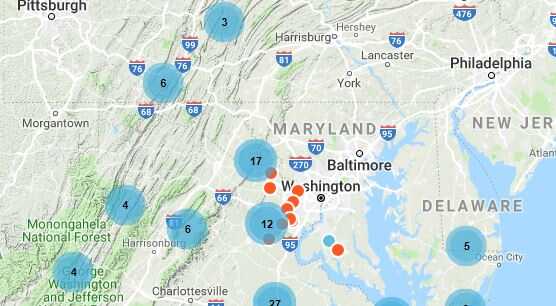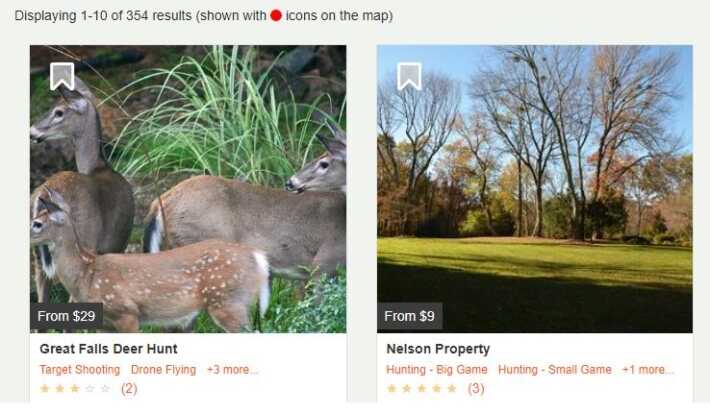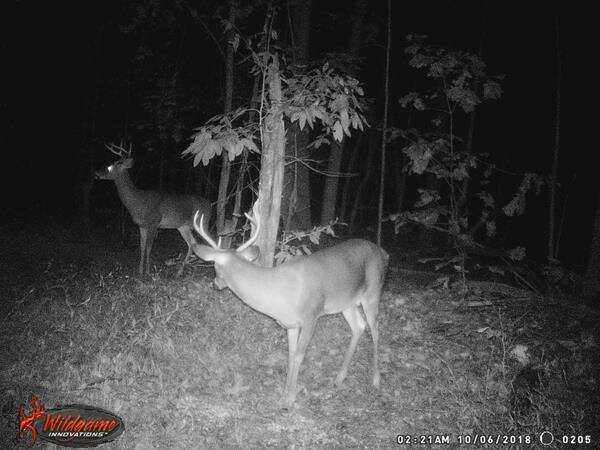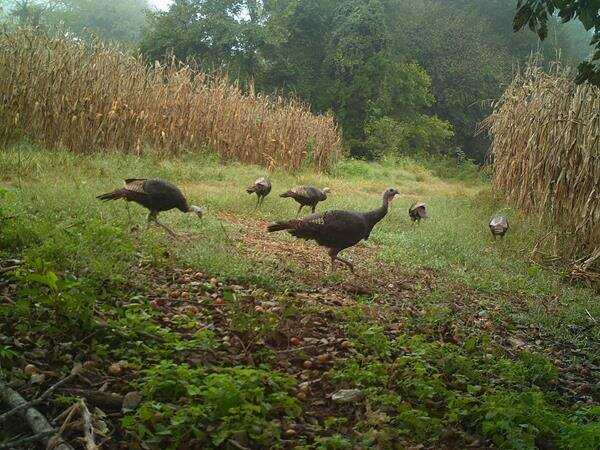
Not a bad buck! This image was taken on a property listed on Outdoor Access, a 14-acre parcel in northern Virginia. (Photo: Outdoor Access Facebook)
Deer season has come and gone here in Texas, and I only got into a tree stand on a handful of weekends. Why? Aside from the crushing weight of deadlines and the kids’ hectic schedules, I have another problem: I live in the suburbs.
As a recent transplant to Waco, I haven’t built a list of friendly landowners willing to let me wander their property in search of Whitetail. And I know I’m not alone when I say that a multi-thousand-dollar lease isn’t in the cards right now, even if I split the bill among my hunting buddies.
Fortunately, help may be on its way.
Founded in 2016 by entrepreneurs and outdoorsmen Jamie Christensen and Buck Robinson, Outdoor Access connects hunters looking for a trophy with landowners looking to make some extra cash.
“A lot of our members are guys who live in the city and used to hunt as kids. They’ve lost that,” Robinson told GunsAmerica. “They don’t have the connections to the landowning community. So we’ve made it really easy for them to do what they want to do, pay a fair price for being able to do it, and still make it to their kid’s soccer game that afternoon.”
Outdoor Access could be likened to a high-security Airbnb for hunters and outdoor enthusiasts. “Members” can search land listings in their area that accommodate a variety of activities, including hunting, fishing, camping, and target shooting. Landowners charge on a per-day basis (usually between $10 and $50), so members can reserve the property for a single day or several days at a time.
The company also recently introduced an “extended rental” option, which allows landowners to lease their property to one member for several weeks. This allows hunters to control pressure, and the cost-per-day is generally cheaper.
Outdoor Access began with 13 properties spread across three counties in Virginia. Since 2016, they’ve grown to over 500 properties, and they expect to have well over 4,000 members by the end of this year.
Any landowner in the U.S can list their property on Outdoor Access, but Robinson said the vast majority of their landowners live in Virginia, North Carolina, and Maryland. Building slowly to maintain a good balance between members and landowners, the company plans to expand along the eastern seaboard by 2019 and move west to the Mississippi River by 2020. Ultimately, Robinson said, they’d like to grow both nationally and internationally.
A Different Model
Leveraging the gig economy to serve the hunting community isn’t a new idea. Robinson admitted that several other companies have tried similar business models, but they haven’t been able to address the concerns of both landowners and outdoor enthusiasts.
For both sides of the Outdoor Access clientele, the first potential problem is a lack of supply or demand. Too many landowners and the member pool won’t be large enough to justify a property owner’s efforts. Too many members and hunters will become frustrated with the lack of options.
“Any two-sided marketplace has a tendency to implode,” Robinson told GunsAmerica. “We’re growing intentionally at a speed that’s sustainable and that creates a real foundation for long-term success.”
SEE ALSO: Honkers in The Chilly Morning: Goose Hunting in Central Manitoba
The Outdoor Access team identifies and contacts property owners based on location and property attributes. While any landowner can use the tool, they’ve found that this personal approach yields the best results and ensures the landowner pool doesn’t grow too fast.
Member growth seems to have followed suit. Searching through listings near my hometown in northern Virginia, I found several properties with lots of availability over the next three months. Some landowners only open their properties on the weekends and others only allow bow hunting, but every property I checked included images, a property description, and several member reviews.
There are other concerns, however, that specifically affect either side of the Outdoor Access marketplace.
“We heard it time and time again from landowners,” Robinson said. “They say, ‘People are always knocking on my door asking if they can come out. But I don’t know who they are and I’m reluctant to let a stranger onto my property.’ That’s one of the reasons we’ve instituted a background check from day one. We want to be able to tell that landowner that this is someone they want to have on their property.”
Outdoor Access’ background check policy is one of the ways it sets itself apart from websites like Airbnb and similar land-leasing services. Landowners can control who comes onto their property, of course, but a background check also provides accountability: a member who disregards land use rules can’t create a new account and continue using the service. By setting up higher barriers to entry, Outdoor Access encourages real buy-in from members.
“We want members to feel a level of investment in protecting the platform as a whole,” Robinson explained. “Like, ‘This is something I feel privileged to be a part of, and I want to be careful to protect.’”
On the other side of the Outdoor Access marketplace, hunters worry that they’ll spend time and money on a property that doesn’t yield results. There’s nothing worse than waiting patiently for the buck that never appears as you listen to your lease money slowly trickle down the drain.
Robinson says his company has addressed those concerns as well. First, he encourages prospective hunters to contact property owners and set up a scouting visit. Members can verify that a landowner’s claims about water and deer habitat are legitimate before purchasing the lease. Many landowners also post images of game cameras or hunters posing with harvested game.
The website also includes a review section where members can post their success (or lack thereof), and I found the mapping tool to be intuitive and helpful for initial scouting.
SEE ALSO: High Pressure Hunting Units – Scouting With Technology
Ultimately, Robinson pointed out, the short-term lease structure provides the exclusivity of other lease options with the flexibility to move between properties in search of different game.
“Even if I was to get a lease on a particular property for 52 weeks unless that property is big enough to accommodate virtually any type of game, I’m locked into whatever that land has on it,” Robinson said.
Public land offers a wider variety of game but comes with its own set of disadvantages.
“[On public land], I could get up at three in the morning, and some bozo comes walking through and ruins my whole day hunt,” Robinson quipped. “I want to know that when I’m going out, I’m getting the land all to myself.”
A Great Option
If you have a long-term lease already filled with prime deer habitat, Outdoor Access might not appeal to you. But if you’re like me—lacking in both free time and expendable funds to justify that kind of commitment—Robinson’s model is worth a look. You might not find any properties in your state this season, but that’s likely to change in a few years.
For landowners, the ability to vary pricing based on day of the week and time of year can turn a liability into a lucrative income stream. The company’s background check requirement and built-in liability insurance also give property owners peace of mind as they invite strangers to use their land.
The hunting community is shrinking as our country becomes increasingly (sub)urbanized, but companies like Outdoor Access could start to reverse that trend. By connecting landowners to hunters in a mutually beneficial relationship, Outdoor Access is hoping to change the way we access land—and the critters that live on it.






They are only interested in making a profit off other peoples land at the expense of Hunt Clubs who have hunted property for years. Pricing the low man out of being able to afford to hunt.
This company does not care about destroying the small Hunt Clubs and the land. They shuffle hundreds of people through lands that only a small amount of members ever used. They are a
Disgrace to the hunting community!!
Looking for leased land in South Mo. for hunting
http://www.texasdeerleases.net
Mr. Michaels you are absolutely on the wrong track about day hunting in Texas. First the cost is far more than you quoted. It usually is around $450 for a weekend. The hunters shoot anything both legal and illegal. The majority of the land owners do not follow any guide lines as far as what and how many deer are harvested. The hunters want something and have no vested interest in a deer management program. How do I know this: I live on property in central Texas and have day leasers on the land behind me and now the ranch beside me is selling 10 acre lots that I expect will be partially used for hunting. This is dangerous. I am sure there may be day leasers that do follow a deer management program but according to TPWD , very few. The land owners are making very good income of day leases.
We need you to come to the Great Lakes area too
About the Airbnb for hunting model this could be a good idea! Extend to fishing as well, I am in Venice FL and seeking places to bass fish! I would love to pay some of these golf courses angreens fee to fishe their ponds!